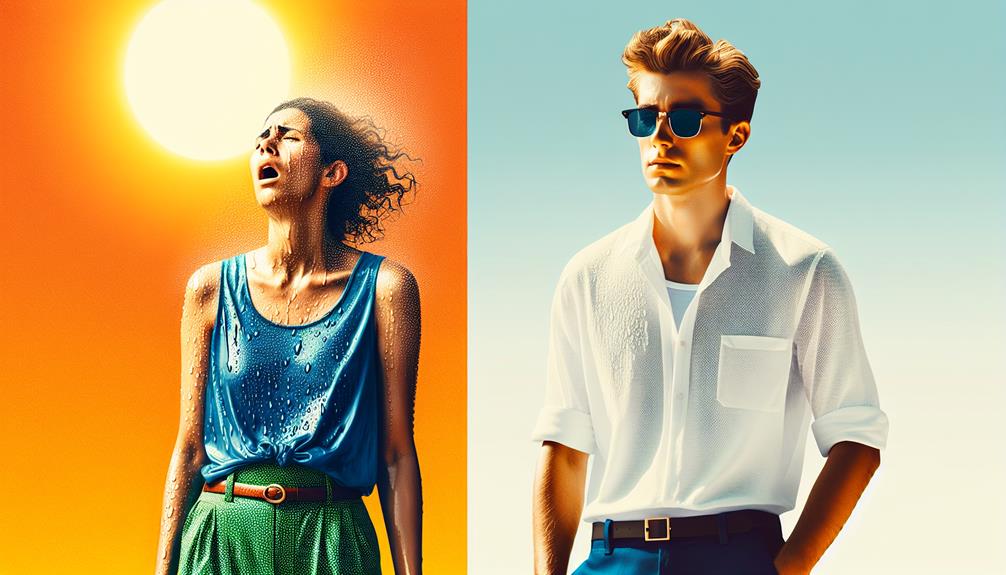I've always wondered if rayon's the culprit behind that sticky, sweaty feeling I get on a hot day. It's supposed to be breathable, right? But sometimes, it feels like it's holding onto moisture more than letting it escape. Now, I know it's not just me—rayon really can be a bit of a mixed bag when it comes to managing sweat. Sure, it's got its perks, but when you're facing high humidity or breaking a sweat, it might not be your best bet. So, let's dig into why that is and what might be a better choice for those sweltering days.
Table of Contents
Key Takeaways
- Rayon absorbs moisture but can feel damp and less breathable, potentially leading to discomfort.
- The quality and type of rayon can impact its moisture management and comfort level.
- Rayon's breathability and moisture-wicking properties vary, making it less ideal for high-sweat activities.
- Blends of rayon with other fabrics might offer better moisture management for outdoor activities.
- Pure rayon garments might trap moisture and heat, making you feel sweaty in warm conditions.
Understanding Rayon Fabric
Rayon's a semi-synthetic fabric that's got a rep for feeling soft and silky, kinda like silk, but there's more to it than just its smooth vibe. It's made from cellulose fibers, which come from wood pulp. This makes it a unique blend of natural and synthetic, giving it that luxurious feel without the hefty price tag of real silk. But when we dive into how it performs, especially in terms of dealing with sweat and heat, there's a bit to unpack.
For starters, rayon's known for being breathable. This means it lets your skin breathe, making it a decent pick for warmer weather. It's also got moisture-wicking properties, which is a fancy way of saying it can pull sweat away from your skin, helping to keep you dry. However, it's not all smooth sailing. Rayon can hold onto moisture too, which might make it feel a bit damp if you're really sweating it out. That's why the quality and type of rayon matter a lot. Some blends are designed to manage moisture better and offer more breathability than others. So, if I'm looking for something to wear on a hot day, I'd definitely consider the blend before making a choice.
Rayon's Moisture Management
After covering the basics of rayon, let's focus on how it handles moisture. You're probably wondering if this fabric can keep you comfy on those sticky, sweaty days, right? Well, here's the lowdown on rayon's moisture management:
- Absorbs Moisture: Rayon is pretty good at soaking up sweat. It pulls moisture away from your skin, which is a plus. But don't get too excited just yet.
- Holds onto Water: The catch is, once rayon gets wet, it likes to stay that way. It's not the quickest at drying out, which can be a bit of a bummer if you're looking for something that'll stay dry and comfy all day.
- Feels Damp and Less Breathable: Because it holds onto water, rayon can make you feel like you're wrapped in a damp towel, especially in hot and humid conditions. Not exactly the cool, airy vibe you might be going for.
- Not the Best for Sweaty Activities: If you're planning on doing something that'll get you sweating a lot, rayon mightn't be your best friend. It's just not as effective at keeping you dry compared to other moisture-wicking fabrics.
Comparing Rayon With Polyester
When comparing rayon with polyester, it's clear that each fabric has its pros and cons, especially when it comes to managing sweat and staying dry. As someone who's dived deep into the world of fabrics, I've gathered that rayon, being a semi-synthetic fabric made from cellulose fibers, offers a soft and silky feel that's hard to beat. It's one of those breathable fabrics that really allows your skin to breathe, thanks to its ability to absorb moisture. This makes rayon an attractive option for everyday wear, especially in situations where comfort and airflow are key.
On the flip side, polyester, a fully synthetic fabric, takes a different approach. It's hydrophobic, meaning it repels water rather than absorbing it. This characteristic can be a double-edged sword. While polyester mightn't get as damp as rayon, it doesn't offer the same level of breathability. Polyester garments tend to trap heat and moisture against the skin, which isn't ideal for those sweaty days or intense physical activities.
The Impact of Weather on Rayon
Let's talk about how the weather really affects rayon, especially when it comes to breathability and humidity.
I've noticed rayon can get pretty sticky and uncomfortable in hot and humid conditions because it just doesn't let my skin breathe.
Rayon's Breathability Factor
How does rayon hold up in the blistering heat or sticky humidity, given its reputation for breathability and moisture absorption? Well, let's break it down:
- Breathable: Rayon's breathability is a game-changer in hot weather. It allows air to circulate, keeping you cooler than many other fabrics might.
- Moisture-Wicking: It doesn't just soak up sweat; it actually helps to move moisture away from your skin, making you feel less sweaty.
- Quick Drying: Even when it does get damp, rayon dries out pretty fast, reducing that uncomfortable, sticky feeling.
- Comfort: Thanks to these properties, rayon remains comfortable to wear, even when the mercury rises.
Humidity's Effect on Rayon
While rayon's breathability is a plus in hot weather, its performance in high humidity tells a different story. This fabric loves to soak up moisture, making it feel all clingy and damp when it's muggy out. It's like wearing your own personal little steam room. Not cool, especially when you're trying to stay dry and comfy.
Here's a quick breakdown:
| Feature | Rayon vs. Cotton |
|---|---|
| Moisture-Absorbing | Rayon absorbs quickly |
| Feeling on Skin | Can feel damp |
| Best for Humidity? | Not really |
Compared to a natural fiber like cotton, which also absorbs moisture but feels more comfortable, rayon just doesn't cut it in the sweaty, humid weather department.
Rayon in Outdoor Activities
When considering rayon for outdoor activities, it's important to note that its water-holding capacity and slow drying time can be a drawback. We all know how sweat can be a nuisance, especially when you're out hiking, running, or just being active outdoors. Rayon, with its tendency to hold onto moisture, mightn't be your best bet for those sweat-heavy moments.
Here's what I've learned about rayon and outdoor activities:
- Moisture Management: Rayon's not great at this. It soaks up sweat and takes forever to dry, leaving you feeling damp and uncomfortable.
- Comfort When Wet: If you get caught in the rain or sweat a lot, don't expect rayon to keep you warm. It tends to feel cooler, which can be a bummer in certain weather.
- Better Alternatives: Polyester undershirts are my go-to over rayon. They dry super fast, keeping you comfy and dry.
- Experimentation is Key: I've tried different rayon blends and found some do perform better outdoors. Some brands mix rayon with quick-drying fabrics, so it's worth experimenting.
In short, for serious moisture management during outdoor activities, I'd steer clear of pure rayon fabrics.
Alternatives to Rayon
So, we've established that rayon mightn't be the best pick when you're sweating buckets.
Let's look at some other options that could keep you cooler and drier.
We've got natural fibers like cotton and linen on one side, and on the other, there are synthetic choices like polyester and nylon that are great at wicking away moisture.
Natural Fiber Options
For those looking to dodge the sweaty fabric dilemma, natural fibers like cotton, linen, bamboo, and silk offer fantastic alternatives to rayon. Here's why they're top-notch choices:
- Cotton: It's the go-to for breathability and moisture absorption. Perfect for beating the heat and avoiding that sticky feeling.
- Linen: This one's a winner for its lightweight, breathable nature. It doesn't cling to your body, allowing air to flow freely and keep you cool.
- Bamboo: Not only is bamboo fabric super absorbent and breathable, but it's also hygienic. It's a great pick for those seeking sustainable options that still keep the sweat at bay.
- Silk: While silk may not be as absorbent, its lightweight and temperature-adjusting properties make it a stylish, sweat-minimizing option.
Synthetic Fabric Choices
Turning away from natural fibers, let's dive into synthetic options like polyester and nylon that offer sweat-busting benefits without the cling of rayon. Polyester's my go-to for a workout tee because it's all about keeping you dry with its moisture-wicking magic and quick-drying powers. Then there's nylon, tough as nails and just as good at wicking away sweat, making it a solid pick for your more adventurous days.
But don't forget about acrylic and spandex. Acrylic mightn't win the breathability contest, but it's light and works for those cooler, less intense occasions. Spandex, though, brings its A-game with stretch and moisture-wicking properties, even if it doesn't breathe as easy. So, depending on what you're up to, these synthetics can really step up to plate as alternatives to rayon.
Caring for Rayon Garments
I've found that taking care of rayon garments isn't as tricky as it seems, you just need to follow a few simple steps. Rayon, known for its ability to absorb like lightweight cotton, requires a bit of attention to keep it looking its best. Here's how I make sure my rayon pieces stay in prime condition:
- Wash Gently: Always hand-wash or use a gentle cycle on your washing machine. This step is crucial to maintaining the shape and texture of your rayon garments. It's gentle, just like the cycle, and ensures the fabric doesn't get beaten up.
- Avoid Harsh Conditions: Skip the hot water and harsh detergents. They're no friends to rayon. Stick to cool water and mild soap to keep the fibers from getting damaged or shrinking.
- Dry Wisely: Never wring out rayon clothes. Instead, air-dry or lay them flat. This prevents any stretching or distortion that might ruin the fit.
- Low Heat Ironing: Iron on a low heat setting. Rayon doesn't take kindly to high heat, and you definitely don't want to scorch your favorite pieces.
Making the Right Fabric Choice
Choosing the right fabric for your wardrobe isn't just about style; it's also about comfort and function, especially when you're dealing with the heat. Let's face it, nobody wants to feel like they're wrapped in a damp towel on a hot day, and that's exactly what can happen if you're not picky about your fabrics. If you're like me and can't stand the feeling of sweat clinging to your skin, then you've probably realized rayon mightn't be your best friend in the summer.
Here's the deal: rayon, despite its silky feel, can be a trap for moisture and heat, making you feel even sweatier. It absorbs moisture, sure, but it doesn't let go of it easily, leaving you feeling damp and uncomfortable. So, what's the solution? Simple: cotton or linen. These are my go-to summer fabrics because they're champions at managing sweat. Cotton and linen are breathable, they wick moisture away from your skin, and they dry quickly, keeping you cool and dry even on the hottest days.
Frequently Asked Questions
Will Rayon Make You Sweat?
I've found that rayon can indeed make you sweat more. It's not great at wicking moisture and traps heat close to your skin, especially in hot conditions. I'd recommend choosing cotton over rayon to stay cooler.
Does Rayon Smell When You Sweat?
I've found that rayon doesn't really smell when I sweat. It's breathable and wicks moisture away, so sweat doesn't hang around to start stinking. Definitely a better option than polyester for staying fresh.
What Is the Best Fabric to Sweat Less?
To sweat less, I'd pick moisture-wicking synthetics, cotton, or bamboo. These fabrics do a better job at keeping me dry than rayon, especially during workouts or hot days, by effectively moving sweat away.
Is Rayon Good for Humid Summer?
I've learned that rayon isn't the best choice for humid summers. It doesn't wick moisture well, traps heat, and feels damp. I'll opt for more breathable fabrics to stay comfortable in the heat.
- Finding Flannel Fabric Suppliers for the Bangladeshi Market - June 21, 2025
- A Profile of Epyllion Fabrics Ltd: A Leader in Bangladeshi Textiles - June 21, 2025
- Price Analysis of Non-Woven Fabric Bags in Bangladesh - June 21, 2025







